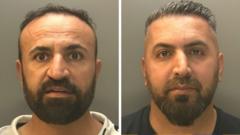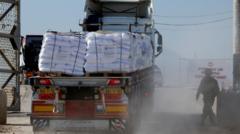
Two men, Dilshad Shamo, 41, and Ali Khdir, 40, have pleaded guilty to running a sophisticated people smuggling operation that brought approximately 100 migrants to Europe each week over two years. Operating from a car wash in Caerphilly, south Wales, they offered a range of smuggling packages that resembled a travel agency service, which the National Crime Agency (NCA) dubbed “Tripadvisor for people smugglers”.
The smuggling packages were tiered, ranging from bronze to platinum, with prices and risks varying accordingly. The platinum package, costing between £10,000 and £25,000, offered migrants a fake passport and air travel. The gold tier involved vessel transport at £8,000-£10,000, while the bronze package, the riskiest option, cost £3,000-£5,000 and involved travel in heavy goods vehicles.
Most migrants using their service were from Iran, Iraq, and Syria, seeking a better life in western Europe. The smugglers even collected video testimonials from migrants, which were found on their phones and appeared to be promotional material. In these videos, migrants would rate their journey and express gratitude for safe passage.
The NCA tracked down Shamo and Khdir after receiving a tip-off and secretly recorded their phone conversations. In one intercepted call, Shamo boasted about smuggling “six to seven batches” of Kurds from Turkey in a single week.
The BBC investigated the smuggling network further by traveling to Erbil, Iraq, where they discovered similar services advertised on TikTok. An undercover reporter found smugglers offering transportation from France to the UK, with prices ranging from $5,000 to $8,000.
The smugglers used a banking system called hawala, which allows money transfers without physical cash movement and requires no identification. While hawala has legitimate uses, it is also attractive for criminal activities. Derek Evans from the NCA noted that while they hope to have disrupted part of the smuggling industry, someone else would likely take over due to its profitability.
The smugglers made hundreds of thousands, if not millions, of pounds. However, recovering these profits is unlikely due to the anonymous nature of hawala banking. Claire Healy from the UN’s Office on Drugs and Crime emphasized that many countries struggle to understand and respond to this system, often only arresting low-level operators.
TikTok stated it has “zero tolerance” for content promoting human smuggling and works with the NCA to combat organized immigration crime. The UK government pledged to freeze smugglers’ bank accounts and dismantle people smuggling gangs.
Experts like Dr. Healy call for more financial expertise to locate high-level criminals and better regulation of hawala systems to flag suspicious transactions while preserving legitimate business practices.








